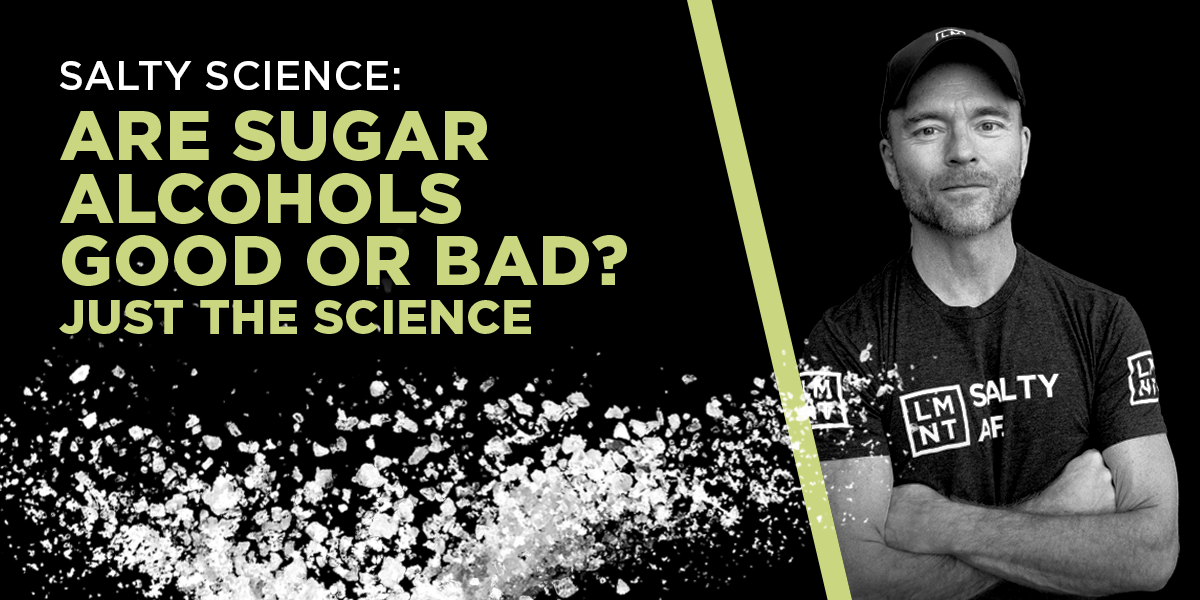When someone asks me if sugar alcohols are healthy, I have to pause. It’s not a black and white issue. It depends on what you’re comparing them to, and also which sugar alcohol we’re talking about.
If you’re comparing them to refined sugar, I’ll take sugar alcohols any day. They have fewer calories, a lower glycemic index, and aren’t trailing a barnyard of data linking them to chronic disease. But if you’re comparing sugar alcohols to stevia, I’ll take that instead. Stevia has zero calories and—unlike sugar alcohols—rarely causes digestive upset.
But even within their own category, there are many sugar alcohols to choose from: xylitol, sorbitol, maltitol, mannitol, lactitol, and erythritol to name a few. Each of these have a distinct nutritional profile. Some are decent options, while others are nothing to write home about… and yet here I am.
In this article, I’ll cover 4 common sugar alcohols in detail and elucidate their pros and cons according to the science. Then you can decide if you want to use them. This is called thinking for yourself—I’m a massive proponent!
Sugar Alcohols 101
Sugar alcohols (also called polyols) are sweet carbohydrates that are digested and metabolized differently than sugar. Instead of being digested through the small intestine and raising blood sugar, most sugar alcohols are digested by gut bacteria in the large intestine.
I say “most” sugar alcohols because erythritol doesn’t follow this pattern. Rather, it passes through the small intestine and into the bloodstream, but unlike sucrose (table sugar), it’s not broken down. It’s excreted intact through urine.
By the way, sugar alcohols aren’t some weird chemicals concocted by mad scientists. They’re found naturally in grapes and mushrooms, and when they’re synthesized, they’re synthesized from natural forms of sugar.
Sugar alcohols are used to sweeten medicines, gum, and low-carb processed snacks and sweets. With more and more people going keto, they’re becoming increasingly popular sugar substitutes.
One last thing. Despite the name, there is ZERO ethanol (what we consider alcohol) in sugar alcohols. Somewhere, somebody out there is trying to get buzzed off xylitol gum. But that person isn’t the type of person (like you) who reads evidence-based blogs on sugar alcohols.
4 Common Sugar Alcohols
Here I’ll give a brief rundown of the four most common sugar alcohols. Each has different nutritional profiles and effects on the body.
#1: Maltitol
Derived from maltose (a type of sugar), maltitol is said to mimic sucrose rather nicely. It’s about 90% as sweet and contains nearly half the calories.
But maltitol has a glycemic index of 35—more than half that of sucrose at 65. This means that ingesting maltitol will significantly raise blood sugar for most people. (Note: the glycemic index measures how rapidly a food raises blood sugar on average).
In other words, maltitol isn’t a keto-friendly sweetener. Unlike other sugar alcohols, grams of maltitol should count towards your keto carb limit.
#2: Sorbitol
Sorbitol was once the preferred sugar alcohol for sweetening sugar-free treats. It’s 50-70% as sweet as sugar, contains 2.7 calories per gram, and has a favorable glycemic index of 9.
Why has sorbitol gone out of favor? Because even in small quantities, sorbitol can cause gas, bloating, and other GI issues.
#3: Xylitol
The most researched of the sugar alcohols, xylitol is ubiquitous in gum, medicine, and processed foods. It’s just as sweet as sugar but only has a glycemic index of 13.
Xylitol is better tolerated than sorbitol, but it still causes digestive upset in many folks.
#4: Erythritol
Strong points of erythritol include its glycemic index (0), its low-calorie count (0.2 per gram), its dental benefits, and that it tends to cause fewer GI issues than the other sugar alcohols. Why? Because most of it never reaches the large intestine to be fermented by gas-producing bacteria. Rather, it’s absorbed through the small intestine into the bloodstream, and later excreted intact through urine.
How much later? A 2023 study addressed that question and more. Therein, the authors present a few lines of evidence—observational, mechanistic, and clinical—that may be cause for concern regarding erythritol’s meandering around the bloodstream. More on this later.
Sugar Alcohols: The Good
Sugar alcohols trump sugar on calories, blood sugar effects, dental health, and a few other areas. Let’s cover those now.
Calories
All sugar alcohols are significantly less caloric than sugar. Sucrose has 3.9 calories per gram, while most sugar alcohols have about half that amount. And erythritol has close to zero calories.
Do calories really matter that much? Yes. I believe the bulk of sugar’s evils can be explained by overeating. Not only is it easy to overeat, but it also isn’t satiating. A person could drink soda all day and not feel full. (Millions do.) And soda contains a TON of empty calories. Is it any surprise that we have an obesity crisis?
By sweetening with fewer calories, sugar alcohols can help folks reduce their intake of empty calories.
Blood sugar impact
If you want to live a long and healthy life, it’s wise to minimize the frequency and magnitude of your blood sugar spikes.
High blood sugar causes all sorts of problems. It stokes inflammation, messes with longevity genes, shuts down fat burning, prevents ketogenesis, drives insulin resistance, the list goes on.
How can you keep blood sugar within healthy ranges? Avoiding added sugars like sucrose and high fructose corn syrup is a good place to start. If you want to replace sugar, replace it with low-glycemic sweeteners like stevia, monk fruit, allulose, and perhaps sugar alcohols. Except for maltitol, most sugar alcohols have a mere fraction of sugar’s glycemic impact.
#3: Oral health
Xylitol is well-documented to help prevent cavities. It does so by suppressing the growth of an oral bacteria called Streptococcus mutans that causes plaque to accrue on teeth. That’s why you see xylitol in gum, toothpaste, and mouthwash. It’s good for your choppers.
There’s also research showing that erythritol squashes plaque even better than xylitol. But since erythritol costs more to produce, it probably won’t replace xylitol anytime soon.
Other benefits
Here are examples of other health benefits linked to xylitol:
- Xylitol was found to enhance the intestinal microbiome in mice, which “may exert a favorable effect on bone health”.
- Rats fed xylitol showed improved bone mineral density.
- In a separate study, rats fed xylitol showed increased skin collagen content.
Sugar Alcohols: The Bad
Any reason to worry about sugar alcohols? Beyond the glycemic impact of maltitol (which we already covered), here are the main drawbacks:
Digestive issues
The biggest downside of sugar alcohols is that they cause gas, bloating, diarrhea, and other forms of GI distress. This happens because sugar alcohols are fermented by gut bacteria, and fermentation creates gas as a byproduct.
Heard of FODMAPs? Polyols (aka, sugar alcohols) are the “P” in that group of fermentable carbohydrates. And low-FODMAP diets that restrict sugar alcohols appear to be effective at reducing the symptoms of irritable bowel syndrome. But even for those without IBS, sugar alcohols can be problematic.
Sorbitol is probably the worst offender, which is why it’s becoming increasingly rare. Xylitol is better tolerated, but people still experience nausea, watery feces, bloating, and diarrhea at intakes of 35 to 50 grams. In contrast, 35 grams of erythritol was well-tolerated, though 50 grams caused stomach gurgling and nausea in some healthy people.
Erythritol and cardiovascular disease risk
I alluded to this above, but a 2023 study may have demonstrated cause for concern when it comes to erythritol and cardiovascular disease. If you’re interested, I wrote a full article addressing the study, its merits, and its shortcomings. The short version is that, while I’m not calling for a ban on erythritol, I think it’s wise to go easy on this low-carb sweetener for a while until we have more data.
Not dog-friendly
If you have a dog, keep the xylitol away from them. It’s safe for humans, but not for pups. When dogs ingest xylitol, it triggers (researchers believe) a massive release of insulin, the blood-sugar regulation hormone. This insulin dump causes blood sugar levels to plummet. The resulting hypoglycemia can lead to liver failure, among other complications.
On the bright side, hypoglycemic dogs generally recover well with appropriate veterinary care. But best not to find out.
Are Sugar Alcohols Healthy?
Compared to sugar, sugar alcohols are model citizens of the sweetener community. They’re sweet enough to do the job, low-glycemic, and—most importantly—not linked to every stinkin’ disease in the book.
But they’re not perfect. Even in healthy folks, they often cause GI distress. And folks that have existing gut issues should probably avoid them entirely. The exception to GI distress is erythritol, which largely skips colonic fermentation. It also has the lowest glycemic index and caloric load, but it may have issues of its own when it comes to heart health.
When it comes to low-carb sweeteners, my top 3 picks aren’t sugar alcohols. They’re stevia, monk fruit, and allulose. Read the pros and cons of 12 popular sugar substitutes to learn why the science favors these options. But again, the big win is cutting back on sugar. Do that and you’ve won most of the battle.

